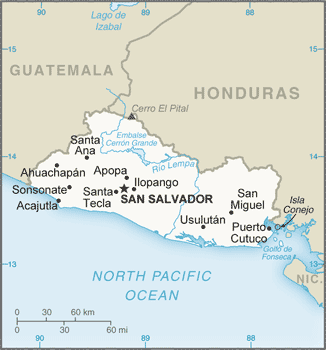
The Washington Post reports today that Temporary Protected Status (TPS) for nationals of El Salvador will not be renewed by the Department of Homeland Security (DHS). According to the paper, Salvadoran nationals "will have until September 2019 to leave or seek other means to obtain lawful residency."
Under section 244 of the Immigration and Nationality Act (INA), the secretary of Homeland Security may grant TPS and employment authorization to nationals of designated countries. As long as TPS is in effect, those aliens who have been granted status may not be removed, except under very limited circumstances.
Countries may be designated for TPS for a number of reasons. Under section 244(b)(1)(A) of the INA, the secretary may designate a country where there "is an ongoing armed conflict within the state", such that the safety of returning nationals could be threatened. Pursuant to section 244(b)(1)(B) of the INA, a country can be designated for TPS if it requests such designation as a result of "an earthquake, flood, drought, epidemic, or other environmental disaster in the state resulting in a substantial, but temporary, disruption of living conditions in the area affected", which renders that country temporarily unable "to handle adequately the return" of its nationals. Finally, under section 244(c) of the INA, the secretary may designate a country for TPS if she finds that there are "extraordinary and temporary conditions" in that country preventing nationals thereof from returning in safety, unless she determines "that permitting the aliens to remain temporarily in the United States is contrary to" our national interest.
Countries can be initially designated for TPS under the INA for anywhere between six and 18 months, and such designations may be extended, subject to periodic reviews occurring no less than 60 days before the end of such designation or extension.
El Salvador was designated for TPS on March 9, 2001, "based on an environmental disaster within that country, specifically the devastation resulting from a series of earthquakes that occurred in 2001." That designation has been extended since that date, most currently through March 8, 2018.
CNN reported on January 8, 2018, that the number of Salvadorans covered by TPS is a "upwards of 250,000", although it admitted that estimates differed as to the number of aliens who would be affected by the secretary's TPS decision. In particular, a Congressional Research Service (CRS) report from November 2017 placed the number of expected re-registrants from El Salvador at 195,000.
In an October 2017 post, I criticized the decades-long extensions of TPS granted to various countries, including El Salvador. Since then, Honduras' TPS designation was extended by then-Acting Secretary of Homeland Security Elaine Duke through July 5, 2018; Nicaragua's designation was terminated effective January 5, 2019; and Haiti's designation was terminated effective July 22, 2019.
As Congress considers how to address the issue of the estimated 690,000 aliens who have been granted Deferred Action for Childhood Arrivals (DACA), pressure will likely build to grant some permanent status to the nationals of El Salvador, Honduras, and Haiti, and possibly Nicaragua, who have been residing in the United States under TPS. CRS estimates the total population of TPS re-registrants from those countries at just over 300,000.
